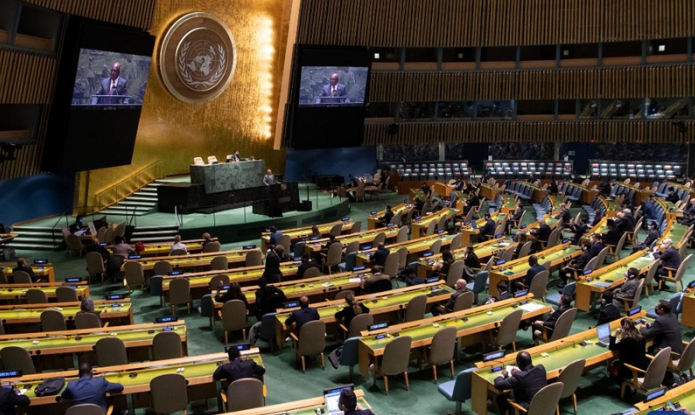Abdulla Shahid, president of the 76th session of the UN General Assembly (UNGA), on Wednesday highlighted the need to build a more sustainable, resilient, and responsible global tourism sector as part of the "long journey" to recover from COVID-19.

Abdulla Shahid, president of the 76th session of the UN General Assembly, speaks at an informal meeting of the General Assembly on his priorities for the remaining eight months of his office at the UN headquarters in New York, on Jan 19, 2022. File photo:Xinhua
At the first-ever High-Level Thematic Debate on Sustainable Tourism held at the UN headquarters in New York, Shahid said that the COVID-19 pandemic halted the entire tourism industry, dealing a "devastating blow to the global economy."
"In 2019, prior to the pandemic, tourism contributed 3.5 trillion US dollars to global GDP. The precipitous drop during the pandemic is estimated to have cost up to 120 million jobs," he noted.
Though easy to sum up the devastation in numbers, capturing the overall toll on people, communities and services, is much harder, particularly for many small island states and least developed countries, which remain heavily reliant on tourism to fuel public spending, he said.
Looking beyond the numbers, tourism plays a deeply human role: "Travel and tourism connect and unite us...builds bridges and facilitates inter-cultural exchanges...[and] fosters peace and solidarity across continents and borders."
Inventive efforts were made to help tourism weather two years of COVID-19, including "travel bubbles," "vaccine passports" and "resilient corridors."
"As the pandemic wanes, the tourism sector is rebounding," he said, speaking of "the human need to connect, to explore, to experience. However, as it rebounds, it is important that we reflect on its future direction."
Shahid noted that tourism is important economically, but its effects on the planet, such as carbon emissions, oceans brimming with plastic, and human impacts on ecosystems and wildlife, must also be considered.
"We know that many of the communities and historic sites around the world that are beloved by tourists are climate and disaster prone and need support to build resilience."
According to the UN Environment Programme's Green Economy Report, a "business-as-usual" scenario predicts that by 2050, tourism will generate an increase of 154 percent in energy consumption for the sector, 131 percent in greenhouse gas emissions, 152 percent in water consumption, and 251 percent in solid waste disposal.
"We cannot allow this to continue. We must not reboot global tourism in a business-as-usual manner, we must be more ambitious than that, more responsible than that," Shahid said.
Throughout the discussions, Shahid encouraged participants to address their commitments under the Sustainable Development Goals and the Paris Agreement on Climate Change, and enhance the inclusion and empowerment of women, youth, indigenous and other marginalized communities.
"Today, I call on all stakeholders to seize every opportunity to transform the tourism sector, and to target a more sustainable, inclusive and responsible approach," he said.
Zurab Pololikashvili, chief of the World Tourism Organization, commented that the current energy crisis contributes to the vulnerability of the tourism sector.














